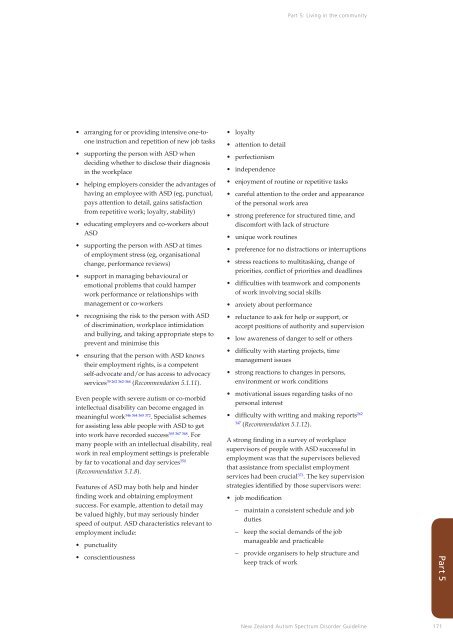New Zealand Autism Spectrum Disorder Guideline - Ministry of Health
New Zealand Autism Spectrum Disorder Guideline - Ministry of Health
New Zealand Autism Spectrum Disorder Guideline - Ministry of Health
Create successful ePaper yourself
Turn your PDF publications into a flip-book with our unique Google optimized e-Paper software.
Part 5: Living in the community<br />
• arranging for or providing intensive one-toone<br />
instruction and repetition <strong>of</strong> new job tasks<br />
• supporting the person with ASD when<br />
deciding whether to disclose their diagnosis<br />
in the workplace<br />
• helping employers consider the advantages <strong>of</strong><br />
having an employee with ASD (eg, punctual,<br />
pays attention to detail, gains satisfaction<br />
from repetitive work; loyalty, stability)<br />
• educating employers and co-workers about<br />
ASD<br />
• supporting the person with ASD at times<br />
<strong>of</strong> employment stress (eg, organisational<br />
change, performance reviews)<br />
• support in managing behavioural or<br />
emotional problems that could hamper<br />
work performance or relationships with<br />
management or co-workers<br />
• recognising the risk to the person with ASD<br />
<strong>of</strong> discrimination, workplace intimidation<br />
and bullying, and taking appropriate steps to<br />
prevent and minimise this<br />
• ensuring that the person with ASD knows<br />
their employment rights, is a competent<br />
self-advocate and/or has access to advocacy<br />
services 39 262 362-364 (Recommendation 5.1.11).<br />
• loyalty<br />
• attention to detail<br />
• perfectionism<br />
• independence<br />
• enjoyment <strong>of</strong> routine or repetitive tasks<br />
• careful attention to the order and appearance<br />
<strong>of</strong> the personal work area<br />
• strong preference for structured time, and<br />
discomfort with lack <strong>of</strong> structure<br />
• unique work routines<br />
• preference for no distractions or interruptions<br />
• stress reactions to multitasking, change <strong>of</strong><br />
priorities, conflict <strong>of</strong> priorities and deadlines<br />
• difficulties with teamwork and components<br />
<strong>of</strong> work involving social skills<br />
• anxiety about performance<br />
• reluctance to ask for help or support, or<br />
accept positions <strong>of</strong> authority and supervision<br />
• low awareness <strong>of</strong> danger to self or others<br />
• difficulty with starting projects, time<br />
management issues<br />
• strong reactions to changes in persons,<br />
environment or work conditions<br />
Even people with severe autism or co-morbid<br />
intellectual disability can become engaged in<br />
meaningful work 346 364 365 372 . Specialist schemes<br />
for assisting less able people with ASD to get<br />
into work have recorded success 365 367 368 . For<br />
many people with an intellectual disability, real<br />
work in real employment settings is preferable<br />
by far to vocational and day services 350<br />
(Recommendation 5.1.8).<br />
Features <strong>of</strong> ASD may both help and hinder<br />
finding work and obtaining employment<br />
success. For example, attention to detail may<br />
be valued highly, but may seriously hinder<br />
speed <strong>of</strong> output. ASD characteristics relevant to<br />
employment include:<br />
• punctuality<br />
• conscientiousness<br />
• motivational issues regarding tasks <strong>of</strong> no<br />
personal interest<br />
• difficulty with writing and making reports 262<br />
347<br />
(Recommendation 5.1.12).<br />
A strong finding in a survey <strong>of</strong> workplace<br />
supervisors <strong>of</strong> people with ASD successful in<br />
employment was that the supervisors believed<br />
that assistance from specialist employment<br />
services had been crucial 373 . The key supervision<br />
strategies identified by those supervisors were:<br />
• job modification<br />
– maintain a consistent schedule and job<br />
duties<br />
– keep the social demands <strong>of</strong> the job<br />
manageable and practicable<br />
– provide organisers to help structure and<br />
keep track <strong>of</strong> work<br />
Part 5<br />
<strong>New</strong> <strong>Zealand</strong> <strong>Autism</strong> <strong>Spectrum</strong> <strong>Disorder</strong> <strong>Guideline</strong> 171











